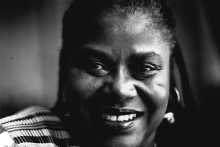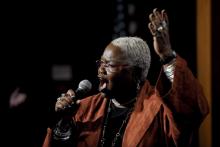Sweet Honey in the Rock

I WAS VISITING my sister and niece in Maine with my middle daughter when we learned that Dr. Bernice Johnson Reagon died. Our aunt in Oakland sent the obituary to our mom in Ohio, then Mom texted us: “Thought immediately of you both and all that she and her music meant to us. Long, lovely memories.”
Even in the news of her passing, Reagon, the founder of the celebrated music ensemble Sweet Honey in the Rock, was connecting women across generations, geography, religious, and racial categories. The music of Sweet Honey helped my mom, a white Quaker woman and Methodist pastor from rural Ohio, find her voice. It also shaped my sister and me as biracial Black women growing up in Washington, D.C. in the ’80s and ’90s. I took a course from Dr. Reagon during my senior year in high school. I never saw her again. Waves of grief and gratitude washed over me.
The day we got the news, we woke in a tent after camping near where the sun rises first over North America. As we drove past towering pine trees, taking in the news of one more passing — each death stirs up the sadness of all the other losses and more to come — my sister and I played our favorite Sweet Honey songs. We sang along to Reagon’s “I Remember, I Believe” from the 1995 Sacred Ground album: “My God calls to me in the morning dew / The power of the universe knows my name / Gave me a song to sing and sent me on my way / I raise my voice for justice, I believe.”

Joe Biden was a young senator from Delaware when he was first exposed to the evils of apartheid. As the only white lawmaker in a congressional delegation to South Africa, he resisted security officers who tried to usher him through one door, and his more senior black colleagues through another.
“I had what we Catholics call an epiphany,” the vice president said Wednesday as official Washington packed the National Cathedral to recall the life and legacy of former South African President Nelson Mandela.
“He was the most impressive man or woman I have ever met in my life,” Biden said of Mandela, who died peacefully on Dec. 5.

“I woke up this morning with my mind set on justice...”
So sang Sweet Honey In the Rock’s Dr. Ysaye Barnwell this morning. And, sitting in a room with hundreds of activists, occupiers and people of similar persuasions, it was hard not to embrace that mindset.
Maybe it’s a failing of my own, and a comment on my devotion to the 24-hour news cycle, but recently I have lost sight of the excitement and intent that the Occupy movement originally injected into the psyche of the nation.
Blessedly, this morning’s gathering, in the welcoming environment of Church of the Pilgrims in Washington, D.C., was an opportunity to hear once again words of hope, energy and defiance. The People’s Prayer Breakfast was everything I hoped and expected it to be.
It was friendly, optimistic and (as there should be at any good breakfast meeting), there was food aplenty for everyone in the bustling hall beneath the church — a mishmash of young, old, people of different faith traditions and various cultures. A large contingent of students from a local Quaker school injected a youthful optimism into the morning (filling the energy gap that even a strong coffee could not supply at 7:30 a.m.)
The atmosphere was one of peace and contentment. And yet, at the same time, there was urgency in the voices of those who addressed us.